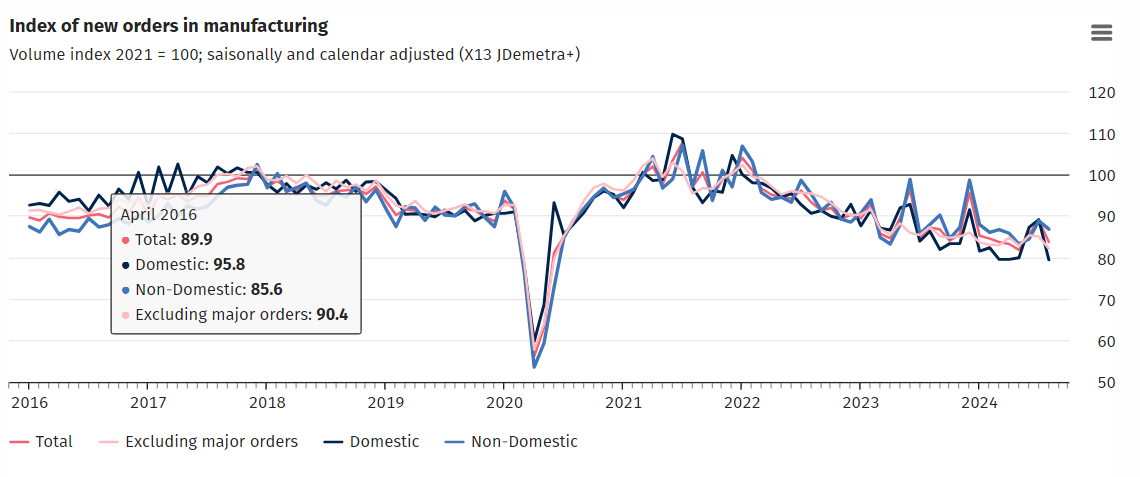German Recession Fears Rise After Factory Orders Drop
New factory orders in Germany dropped 5.8% month-on-month in August

German factory orders declined more than expected in August, adding further concerns about a recession in Europe’s largest economy.
New orders dropped 5.8% month-on-month in August, according to provisional data on October 7 from the Federal Statistical Office (Destatis). Economists had forecast a decline of 2%, making it the steepest decline since January, according to 17 economists surveyed by Bloomberg.
Factory orders dropped after “very large orders” for aircraft, ships, trains, and military vehicles “placed in the previous month,” Destatis said in its press release. When large-scale orders are excluded, new orders in August 2024 were 3.4% lower than in July 2024, it said.
Germany's economy ministry plans to downgrade its 2024 economic growth forecast, expecting Europe's largest economy to shrink by 0.2%, the German newspaper Sueddeutsche Zeitung reported on Sunday.
“Given the persistently weak demand and continued deterioration in corporate sentiment, a noticeable recovery in the industrial economy in the second half of 2024 is unlikely,” the economy ministry said in a statement.
DAX fell 170 points following the news, finding its footing around the 19,000 level. The index remained down 0.3% at 12 PM CET. However, as the price failed to reach the lows from Friday, the technical thesis of a short-term pullback at the beginning of Q4 remains intact.
German Economy Has Economic Headwinds
Germany faces an increasing number of economic headwinds.
The decision by the European Union (EU) on October 4 to impose tariffs against Chinese electric vehicle makers may impact German automakers more if a trade war erupts. Germany vetoed the decision by the EU after pressure from Mercedes-Benz Group AG and BMW AG.
Volkswagen AG has warned that it is considering closing two factories and has axed an agreement protecting jobs in Germany as increased competition with rival Chinese car manufacturers.
The economy is still struggling to shake off the fallout from the gas-supply shock in the wake of Russia’s invasion of Ukraine, Bloomberg reported.
Germany’s Bleak Outlook
The bleak outlook adds to growing concerns about the German economy. Gross domestic product fell by 0.1% in the second quarter of this year. Experts are now signaling economic stagnation this year, the ZEW Institute said on September 23. They lowered their 2024 growth forecast by 0.1 percentage points to just 0.1%.
“Germany continues to fall behind the rest of the eurozone in terms of both actual growth and growth expectations,” it said.
Germany will release industrial production data on Tuesday, which is forecast to increase by 1%. In July, industrial production declined by 2.4% with the automotive industry having “a particularly negative impact,” Destatis said.
New orders in the capital and intermediate goods sectors in Germany fell 8.6% and 2.2%, respectively, Destatis said. New orders for consumer goods declined by 0.9%.
German Business, Consumer Sentiment Sours
Business and consumer sentiment in Germany has soured as well.
The Ifo Institute’s expectations gauge, indicating firms' projections for the next six months, fell in September to 86.3, the lowest since February.
The Ifo expectation index for German retail “clouded over” in September, falling l to -25.6 points, down from -23.1 points in August, according to data released on October 7. Retailers assessed their current situation as slightly worse and have become more pessimistic about the coming months, it said.
“Consumers are unsettled about the economic policy environment,” ifo expert Patrick Höppner, said in the press release. “That means that no further dynamic growth in private consumer spending can be expected for the rest of 2024.”.





